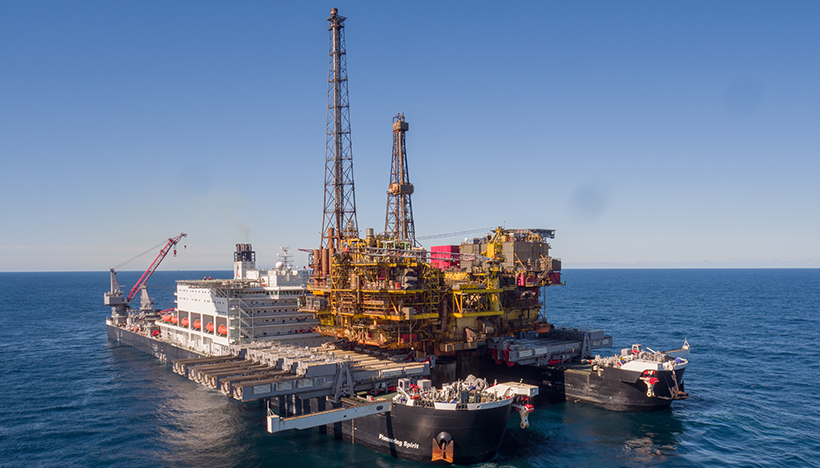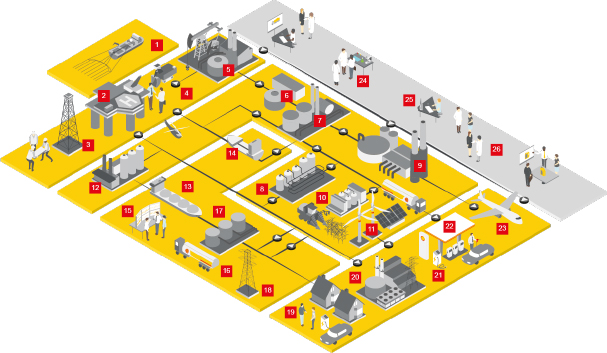Case study Tax treatment of decommissioning costs in different jurisdictions
Decommissioning is part of the normal life cycle of every oil and gas structure. Safe and responsible decommissioning is a priority for Shell when a facility reaches the end of its life. This includes restoring the surroundings of offshore platforms and facilities in line with relevant legislation, while taking our own environmental standards into account.
The decommissioning phase of work is heavily regulated and subject to tax legislation that enables tax relief. The concept of granting tax relief for genuine business expenses is fundamental to regimes that tax profits and is applicable and available to all businesses in all industries with few exceptions. Decommissioning costs in the oil and gas industry are treated consistently as a business expense.
At the end of 2020, Shell reported $27.3 billion on its balance sheet for non-current decommissioning and other provisions (see our Annual Report and Accounts).
Corporate income tax is paid on profits, which for an oil or gas field are calculated as the sum of the income generated by the facility, minus the costs of setting it up, operating it and decommissioning the field at the end of its life.
Decommissioning costs are treated differently depending on a country’s tax regime. For example, in the UK costs can only be deducted once decommissioning starts, whereas in other countries these costs can be deducted annually before the asset is decommissioned. Here we present examples of how tax relief for decommissioning costs is obtained in two different countries:
Decommissioning in the UK
Our largest decommissioning project is the Brent oil and gas field, which lies in the North Sea between the UK and Norway. Preparation for decommissioning the four Brent platforms – Alpha, Bravo, Charlie and Delta – started in 2006. We decommissioned Brent Delta in 2017 and Brent Bravo in 2019. In 2020, the Brent Alpha topside, the part of the platform that is visible above the sea, and the upper jacket, which supports the topside, were removed and sent for dismantling and recycling onshore.
The UK tax regime prescribes that a deduction for decommissioning costs is available only when the cash associated with decommissioning costs has actually been spent. If large sums of cash are spent on decommissioning in a year when insufficient income is generated by the business, this can result in a tax loss for that year. When this occurs, that loss is used to offset historical tax that has been paid in prior years and this results in a tax refund.
The taxable profits over the field’s lifetime will be the same as if the decommissioning deductions had been taken earlier, before decommissioning. The refunds do not represent any additional subsidy or contribution towards this cost.
The UK government has received more than £20 billion [A] in tax revenues (in today’s money) from the Brent oil and gas field since it started producing in 1976. In 2020, Shell received a £67.5 million [B] refund in respect of its Brent decommissioning activities. Decommissioning is due to be completed in 2024. Once complete, the total tax refunds Shell will have received are expected to be significantly less than the tax payments made.
[A] This is the equivalent of $25.7 billion calculated using yearly average exchange rate for USD/GBP in 2020 of 1 USD = 0.7795 GBP.
[B] This is the equivalent of $86.6 million calculated using yearly average exchange rate for USD/GBP in 2020 of 1 USD = 0.7795 GBP.

Decommissioning in Kazakhstan
Kazakhstan requires companies operating under active concession or production-sharing agreements that have been signed since 1997 to set up a decommissioning fund. Each individual contract specifies when the fund should be established. Companies are required to make regular contributions to the fund to cover any future decommissioning costs. Contribution amounts are specified in the concession contract or production-sharing agreement. This system allows for companies to spread decommissioning costs over the lifetime of a project.
Once companies have paid these contributions into an escrow account, they can tax-deduct them rather than wait years for the actual decommissioning costs to be deductible at the end of a project’s lifetime.
If actual decommissioning costs exceed what is available in the fund, then the rules allow for excess costs to be tax deductible in the year the cash is spent. If the fund accumulates more cash than is spent on decommissioning, then the excess cash is subject to corporate income tax as income at the end of the life of the field. Shell’s existing production-sharing agreements in Kazakhstan have similar provisions to the decommissioning fund.








